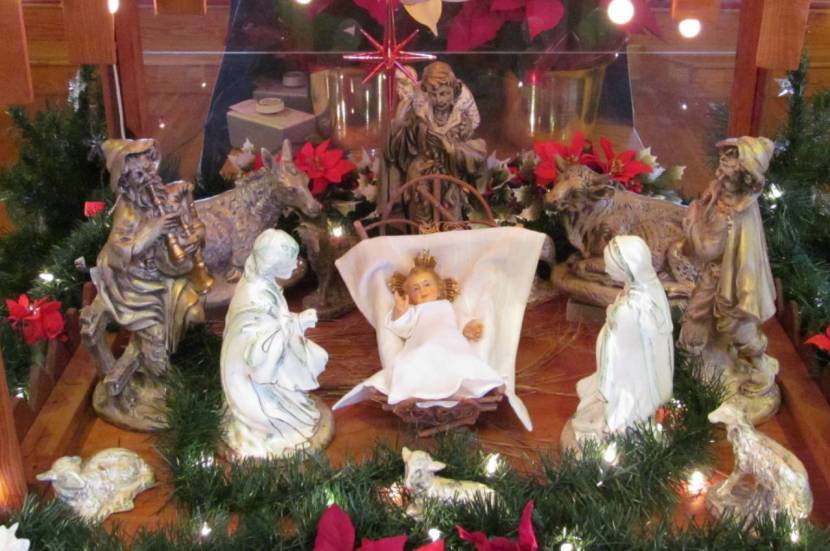Imitate God’s Generosity At Christmas And Beyond
 August 12, 2019
August 12, 2019
Human beings are naturally selfish. For instance, a child who refuses to give a share of his meal to his father is exhibiting the vice of selfishness. That is how we are with God. God has blessed us with whatever possession we have. He now asks us to give a little share of our possessions to him through the help we render to our neighbour. Unfortunately, like a little child who refuses to be “generous” to his father, we refuse to be “generous” to God, our Father and Creator.
Before I go into a scriptural survey on generosity, there are some key terms that must be clarified. The first key word is “imitate”. To “imitate” somebody or something is to copy the person or the thing. In other words, to do what the person does, to speak or behave like the person whom one imitates. What is being said within this context is that human beings, especially Catholic Christians, should be stupendously generous like God, particularly at this Christmas. This is because Christmas is a feast of God’s generosity to mankind. St. John sees God’s offering of His only Son for the salvation of the world as His greatest gift to humanity. “For God loved the world so much that he gave his only Son, so that everyone who believes in him may not die but have eternal life. God did not send the Son into the world to condemn the world; but that, through him the world might be saved (John 3:16-17).
Another term to be defined is “God.” Always used as a proper noun, in Christianity, Islam and Judaism, God is a Being or Spirit that is worshipped and is believed to have created the universe. Indeed, God is the Creator of Heaven and Earth and everything therein. In authentic Catholic orthodoxy, God is described as the Father of our Lord Jesus Christ, who has no beginning or end.
Generosity simply means the state of being generous. The adjective “generous” is explained as “giving or willing to give freely.” Thus, generosity can be described as willing to give somebody money, gifts, time or kindness freely.
What is Christmas? In his book entitled Catholic Christians’ Companion, Fr. Peter Ogwuche explains that: “The word ‘Christmas’is from the Old English Cristesmaesse, which literally means ‘Christ’s mass.’ It is an annual commemoration of the birth of Jesus Christ, celebrated generally on December 25 as a religious and cultural holiday by billions of people around the world. A feast central to the Christian liturgical year, it closes the Advent season and initiates the twelve days of Christmastide. Christmas is a civil holiday in many of the world’s nations; it is celebrated by an increasing number of non-Christians, and is an integral part of the Christmas and holiday season. According to Keller (1983), for the first time, December 25 was referred to in documents as Christmas Day in A. D. 324. Under the Roman emperor Justinian (AD 527-565), it was recognized as an official holiday.” (Ogwuche, pp. 216-217).
In his book entitled All About Christmas: A Historico-Biblical Study of the Birth of the Messiah, p. 166), Fr. Dr. Sebastian Kizhakkeyil acknowledges the fact that “Christmas is a feast that recalls God’s generosity towards humanity by sending His own Son to our world where he identified himself with the poor and the downtrodden. He was born in a manger in the company of animals rather than in the comfort of a royal palace. Christmas is a feast for joy and celebration. For twelve days beginning with Christmas Day people express their joy and gladness in various ways. It is indeed right and just to be joyful at Christmas because the angels announced to the world that the birth of the Messiah would bring glory to God and peace to people of good will (see Lk. 2:14)”.
Holy Scripture is replete with statements from God, Jesus Christ and his apostles, on the fact that it pays to be generous. In other words, these statements highlight that being generous is not only rewarding to the person who is ready to practise this virtue, but it is also salvific. Let us make a brief scriptural survey. God said to the people of Israel: “If… there is a fellow-Israelite in need, then do not be selfish and refuse to help him. Instead, be generous and lend him as much as he needs” (Deut. 15:7-8). King David praises God for being all in all in terms of material possessions. He acknowledges that everything is a gift from God (1 Chronicles 29:12-14).
The Psalmist says, “Happy are those who are concerned for the poor; the Lord will help them when they are in trouble. The Lord will protect them and preserve their lives; he will make them happy in the land; he will not abandon them to the power of their enemies. The Lord will help them when they are sick and will restore them to health” (Ps. 41:1-3).
The Book of Proverbs says, “Some people spend their money freely and still grow richer. Others are cautious, and yet grow poorer. Be generous, and you will be prosperous. Help others, and you will be helped” (Prov. 11:24-25). Then, “If you refuse to listen to the cry of the poor, your own cry for help will not be heard” (Prov. 21:13). “Be generous and share your food with the poor. You will be blessed for it” (Prov. 22:9).
Jesus demonstrates his generosity when he fed Five Thousand people with five loaves and two fish (see Mt. 14:19-20). Then, on judgment day, we shall be treated according to our generosity to the people of God, especially the poor (see Mt. 25:31-46). Through St. Luke, Jesus tells us: “Give to others, and God will give to you” (Lk. 6:38). The Parable of the Good Samaritan demonstrates generosity (see Lk. 10:25-37). Here, Jesus asked the teacher of the Law, ‘“In your opinion, which one of these three acted like a neighbour towards the man attacked by the robbers?” The teacher of the Law answered, “The one who was kind to him.” Jesus replied, “You go, then, and do the same”’(Lk. 10:36-37). Jesus tells his disciples, “Sell all your belongings and give the money to the poor” (Lk. 12:33). The Parable of the Rich Man and Lazarus is a parable that demonstrates the negative consequences of lack of generosity (Lk. 16:19-31). The rich man never committed any other offence besides the fact that he was insensitive to the plight of Lazarus.
The Acts of the Apostles reports how the apostles and the Christian communities at the time of the apostles demonstrated practically their acts of generosity towards all. “All the believers continued together in close fellowship and shared their belongings with one another. They would sell their property and possessions, and distribute the money among all, according to what each one needed” (Acts 2:44-45).
St. Paul tells us how he himself had worked hard in order to provide for himself and his companions and admonishes us to do the same. He says, “I have not wanted anyone’s silver or gold or clothing. You yourselves know that I have worked with these hands of mine to provide everything that my companions and I have needed. I have shown you in all things that by working hard in this way we must help the weak, remembering the words that the Lord Jesus himself said, ‘There is more happiness in giving than in receiving’” (Acts 20:33-35). In his first letter to the Corinthians, St. Paul asks rhetorically, “Who made you superior to others? Didn’t God give you everything you have? Well, then how can you boast, as if what you have were not a gift?” (1 Cor. 4:7). In his letter to the Galatians, St. Paul simply says, “Help to carry one another’s burdens, and in this way you will obey the law of Christ” (Gal. 6:2). In his first letter to Timothy, St. Paul says, “Command those who are rich in the things of this life not to be proud, but to place their hope, not in such an uncertain thing as riches, but in God, who generously gives us everything for our enjoyment. Command them to do good, to be rich in good works, to be generous and ready to share with others. In this way, they will store up for themselves a treasure which will be a solid foundation for the future. And then they will be able to win the life which is true life” (1 Tim. 6:17-19). In his first letter, St. John says, “Rich people who see a brother or sister in need, yet close their hearts against them, cannot claim that they love God. My children, our love should not be just words and talk; it must be true love, which shows itself in action” (1 John 3:17-18).
No one can outdo God in generosity. Indeed, “…God is able to fill you with every good thing, so that you have enough of everything at all times, and may give abundantly for any good work” (2 Cor. 9:8). Scripture says, referring to God, “He distributes generously to the poor; his goodness lasts forever” (2 Cor. 9:9).
At this juncture, let me mention here two examples of people who have been generous, especially at Christmas. “J. P. Morgan of New York used to throw a Christmas party for hundreds of homeless city boys year after year. Again, in the Christmas season of 1248 King Henry III of England asked his treasurer to fill Westminster Hall in London with thousands of poor and homeless people. There they feasted for the entire Christmas week” (Fr. Dr. Sebastian Kizhakkeyil, p. 166).
Be generous to the poor especially at Christmas; otherwise, this joyful celebration will lose its flavour (joy). In fact, it will no longer be a celebration but a sorrowful situation. Unfortunately, it is this sorrowful situation that characterizes the celebration of Christmas in our Country, Nigeria the so-called Giant of Africa that is almost always in distress due to bad governance, corruption and visionless leadership.
Is there such thing as Christmas bonus in Nigeria any longer? In those good old days, during the political administration of President Shehu Shagari (1979-19833), Christmas bonus was a familiar expression, not only in theory, but also in practice. In other words, civil servants were happy during Christmas and indeed they looked forward to the joyful celebration of Christmas. Why? The reason is not far-fetched. Besides the prompt payment of their salaries and arrears certainly before December 25, some other monetary gifts were given to them as “Christmas bonuses” according to their Salary Grade Level. The reverse is regrettably the case nowadays when salaries are not even paid, sometimes until after the New Year, let alone Christmas bonus! It is not that the money is not still there. The problems which militate against this incentive include bad governance, selfishness, greed, avarice, corruption, etc. People continue to graduate in the practice of various criminal activities including withholding workers’ salaries and even outright non-payment of salaries. The government is learning fast the art of cheating the masses and depriving them of what rightly belongs to them. Sincere civil servants sweat profusely and work hard to ensure that they carry out their duties and responsibilities painstakingly. However, when the time comes for them to enjoy the sweat of their brow, some rogues who constitute themselves into what they call a Democratic Government would deprive them of their salaries. It is situations like the ones described above that informed the choice of this topic for this month’s edition: “Imitate God’s Generosity at Christmas and beyond.” The writer is saying that it is actually rewarding to do so. The rich young man, although obeyed all the commandments of God right from childhood, could not make heaven because of his lack of generosity (Lk. 18:18-27). Just tell yourself that you are going to be perpetually generous with your time, resources, talents, knowledge, advice, etc. This generosity will continue even beyond this Christmas.
By Rev. Fr. Mark Ajiga
 Guy Wilkins
Guy Wilkins Larry Reed
Larry Reed Roxanne Holland
Roxanne Holland Bridget Kennedy
Bridget Kennedy Sally Mendoza
Sally Mendoza